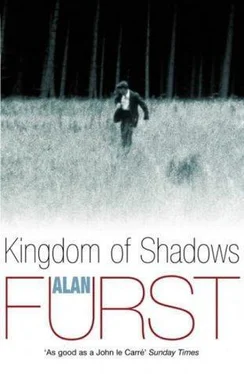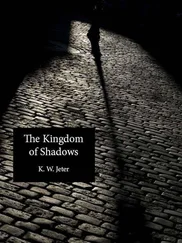Alan Furst - Kingdom of Shadows
Здесь есть возможность читать онлайн «Alan Furst - Kingdom of Shadows» весь текст электронной книги совершенно бесплатно (целиком полную версию без сокращений). В некоторых случаях можно слушать аудио, скачать через торрент в формате fb2 и присутствует краткое содержание. Жанр: Шпионский детектив, на английском языке. Описание произведения, (предисловие) а так же отзывы посетителей доступны на портале библиотеки ЛибКат.
- Название:Kingdom of Shadows
- Автор:
- Жанр:
- Год:неизвестен
- ISBN:нет данных
- Рейтинг книги:5 / 5. Голосов: 1
-
Избранное:Добавить в избранное
- Отзывы:
-
Ваша оценка:
- 100
- 1
- 2
- 3
- 4
- 5
Kingdom of Shadows: краткое содержание, описание и аннотация
Предлагаем к чтению аннотацию, описание, краткое содержание или предисловие (зависит от того, что написал сам автор книги «Kingdom of Shadows»). Если вы не нашли необходимую информацию о книге — напишите в комментариях, мы постараемся отыскать её.
Kingdom of Shadows — читать онлайн бесплатно полную книгу (весь текст) целиком
Ниже представлен текст книги, разбитый по страницам. Система сохранения места последней прочитанной страницы, позволяет с удобством читать онлайн бесплатно книгу «Kingdom of Shadows», без необходимости каждый раз заново искать на чём Вы остановились. Поставьте закладку, и сможете в любой момент перейти на страницу, на которой закончили чтение.
Интервал:
Закладка:
Otto Adler fitted in much better there. “Otto, darling, I think you were born to be Viennese,” his wife said. He had a round, hairless, rosy face, a beaming smile, he wished the world well-one of those bighearted people who can be benign and angry at once and laugh at himself in the bargain. Somehow, he kept publishing the magazine. “We should probably call it The Ox, it plods along in all weathers.” And in time, a little Viennese money-from progressive bankers, Jewish businessmen, union leaders-began to come his way. As Die Aussicht gained credibility, he managed to obtain an article by one of the gods of German literary culture, Karl Kraus, the savage, brilliant satirist whose disciples-his readers, his students-were known as Krausianer.
In 1937, Die Aussicht published a brief reportage by an Italian journalist, the wife of a diplomat, who’d been present at one of Hermann Goering’s infamous dinners at Schorfheide, his hunting lodge. The usual Nazi merriment, with the soup and the fish, but before the main course arrived Goering left the table and returned wearing a rawhide shirt, with a bearskin thrown over his shoulders-a warrior costume from the old Teutonic tribes. Not nearly, of course, enough. Goering was armed with a spear and led a pair of hairy bison, harnessed in chains, around and around the room while the guests roared. Still, not enough. The entertainment concluded with the mating of the bison. “A party to remember,” it said in Die Aussicht. Adler’s children were expelled from school, a swastika chalked on his door, the maid quit, the neighbors ceased to say “Gruss Gott.”
It was a big, drafty old house they found in Geneva. But nobody was very happy there. What the Volksdeutsch and the Austrians did with party operatives, the Swiss did with clerks. Nobody actually said anything about the magazine-he could, apparently, publish whatever he wanted in Democratic Switzerland, but life was a spiderweb of rules and regulations that controlled mailing permits, alien residence, and, it seemed to Adler, the very air they breathed.
It was a little quiet around the dinner table when Adler informed the family they had to move. “A necessary adventure,” he said, beaming away. Under the table, his wife put her hand on his knee. So, December of ‘37, Paris. Saint Germain-en-Laye was a classic of the exile’s geography, it turned out, a time-honored refuge for princes unwelcome in many lands. There was a grand Promenade Anglais where one could walk for hours, just right for a bittersweet contemplation of the lost crown, castle, or homeland. Adler found a sympathetic printer, made contacts in the community of liberal German emigres, and went back to work hammering the fascists and the Bolsheviks. Such was the destiny of the Social Democrat, and who was that man in the raincoat by the newspaper kiosk.
Meanwhile, Adler fell in love with the public gardens of Paris. “What sort of lunatic takes a train to go to the park?” The kind who filled his briefcase with books; Schnitzler, Weininger, Mann, maybe von Hoffmansthal, two pens, and a cheese sandwich, then sat in the Jardin du Luxembourg and watched the dappled light of the plane trees playing on the gravel path. A few centimes to the old dragon who kept watch on the chairs, and one could spend the afternoon in a painting.
At first he went in nice weather, later in light rain. It became his habit. As time went by, as the spring of 1938 worked its way toward whatever summer had in store, Otto Adler, fountain pen scratching out a new editorial or, for a moment, just snoozing, was almost always to be found in the park.
The note from the baroness Frei invited My dearest Nicholas to call at her house at five in the afternoon on the sixteenth of April. Morath took a taxi to the Sevres-Babylone Metro stop and from there walked to the rue de Villon.
Buried deep in a maze of narrow lanes that crisscrossed the border between the Sixth and Seventh Arrondissements, it was, like paradise everywhere, damned hard to find. Taxi drivers thumbed through their city directories, then sped off to the rue Francois-Villon, named for the medieval robber poet, in a distant neighborhood where, on arrival, it was immediately clear to both driver and patron that this was not the right street at all.
The one true rue de Villon could be entered only through a vaulted alley-the impasse Villon-a tunnel of perpetual dusk that dared the courageous automobiliste to try his luck. It could sometimes be done, depending on the model and year of the machine, and was always a matter of centimeters, but it did not look like it could be done. The alley gave no indication of what lay beyond it, the casual passerby tended to do exactly that, while the truly self-confident tourist peered defiantly down the tunnel and then went away.
On the other side, however, light from heaven poured down on a row of seventeenth-century houses, protected by wrought-iron palings, that dead-ended at a garden wall: 3, rue de Villon, to 9, rue de Villon, in a sequence whose logic was known only to God and the postman. In the evening, the tiny street was lit by Victorian gas lamps, which made soft shadows of a vine that twisted its way along the top of the garden wall. The garden belonged to number three-a faint impression of the number could be found on a rusty metal door, the width of a carriage-which was owned by the baroness Lillian Frei. She did not know her neighbors. They did not know her.
A maid answered the door and led Morath to the garden. Sitting at the garden table, the baroness put her cheek up to be kissed. “Dearest love,” she said. “I am so happy to see you.” Morath’s heart warmed, he smiled like a five-year-old and kissed her with pleasure.
The baroness Frei was possibly sixty. She was bent over in a lifelong crouch, and one side of her back humped far above her shoulder. She had shimmering blue eyes and soft, snow-white hair and a radiance like the sun. She was, at the moment, as always, surrounded by a pack of vizsla dogs-not one of which could Morath distinguish from another but which, as the baroness liked to tell her guests, belonged to a vast, capricious, bumptious family who lived out an unending romantic epic in the house and garden. Korto, bred to Fina, loved Malya, his daughter by the gallant and long-departed Moselda. Of course, for the integrity of the line, they could never “be together,” so, in heat, the exquisite Malya was sent to live in the kitchen whilst poor Korto lay about on the garden gravel with his chin slumped atop his forepaws or stood on his hind legs, peered myopically through the windows, and barked until the maid threw a rag at him.
Now they stormed around Morath’s legs and he bent to run his hands along the satin skin of their sides.
“Yes,” said the baroness, “here’s your friend Nicholas.”
The vizslas were fast, Morath got a wet kiss on the eye and never saw it coming.
“Korto!”
“No, no. I’m flattered.”
The dog smacked his forepaws against the ground.
“What, Korto, you want to hunt?”
Morath roughed him up a little and he mewed with pleasure.
“Go to the forest?”
Korto danced sideways- chase me.
“A bear? That would be best?”
“He would not run away,” the baroness said. Then, to the dog, “Would you?”
Korto wagged his tail, Morath stood up, then joined the baroness at the table.
“Pure courage,” she said. “And the last five minutes of his life would be the best.” The maid approached, pushing a glass-topped cart with a squeaky wheel. She set a tray of pastries on the table, poured a cup of tea and set it down by Morath. Silver tongs in hand, the baroness looked over the pastries. “Let’s see …”
Читать дальшеИнтервал:
Закладка:
Похожие книги на «Kingdom of Shadows»
Представляем Вашему вниманию похожие книги на «Kingdom of Shadows» списком для выбора. Мы отобрали схожую по названию и смыслу литературу в надежде предоставить читателям больше вариантов отыскать новые, интересные, ещё непрочитанные произведения.
Обсуждение, отзывы о книге «Kingdom of Shadows» и просто собственные мнения читателей. Оставьте ваши комментарии, напишите, что Вы думаете о произведении, его смысле или главных героях. Укажите что конкретно понравилось, а что нет, и почему Вы так считаете.












